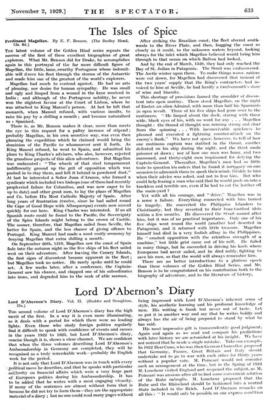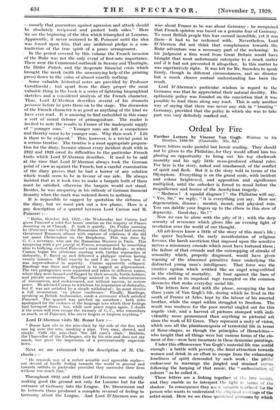Lord D'Abernon's Diary
THE second volume of Lord D'Abernon's diary has the high merit of the first. In a way it is even more illuminating, as it deals with a period for which there were no leading lights. Even those who study foreign politics regularly find it difficult to speak with confidence of events and causes in the years 1922 to 1923, but Lord D'Abernon's diary, concise though it is, shows a clear channel. We are confident that when the three volumes describing Lord D'Abernon's Amba.ssadorship in Germany are completed, they will be recognised as a truly remarkable work—probably the English work for the period.
It is not only that Lord D'Abernon was in touch with every 4olitical move he describes, and that he speaks with particular aakority on financial affairs which were a very large part of European politics during his Ambassadorship. It has to be added that he writes with a most engaging vivacity. If many of the sentences are almost without form that is because he did not try to form them—they are the appropriate material of a diary ; but no one could read many pages without being impressed with Lord D'Abernon's inherent sense of style, his aesthetic learning and his profound knowledge of men. His writing is frank but never out of taste. Let us put it in another way and say that he writes boldly and always has the air of being prepared to stand by what he has said.
His most impressive gift is transcendently good judgment. Again and again as we read and compare his predictions with later history we are astonished at his insight. We have not noticed that he made a single mistake. Take one example. In 1922 Herr Curio, who was then German Chancellor, proposed that Germany, France, Great Britain and Italy should undertake not to go to war with each other for thirty years without a popular vote. M. Poincare would not consider such an arrangement at the time, but in the Spring of 1923 M. Loucheur visited England and reopened the subject, as M. Poincare was anxious after all to find some convenient solution of the Ruhr imhroglio. M. Loucheur proposed that the Ruhr and the Rhineland should be fashioned into a neutral State included in the Reich. Lord D'Abernon remarks on all this : "It would only be possible on one express condition —namely that guarantees against egression and attack should be absolutely reciprocal and protect both sides." Here we see the beginning of the idea which triumphed at Locamo.
• Apparently, it never occurred to M. Poineare until the idea was forced upon him, that any unilateral pledge is a con- tradiction of the true spirit of a peace arrangement.
. In the period covered by this volume the French invasion of the Ruhr was not the only event of first-rate importance. There were the Communist outbreak in Saxony and Thuringia, the Hitler Putsch, and the desperate financial crisis which brought the mark (with the unweary-ing help of the printing
press) down to the value of almost exactly nothing.
- Some valuable historical notes are provided by Professor Gerothwohl ; but apart from the diary proper the most valuable thing in the book is a series of lightning biographical
• sketches and a considered analysis of the French character. Thus, Lord D'Abernon describes several of his dramatis personae before he puts them on to the stage. The discussion of the French character is as good as anything of the kind we have ever read. It is amusing to find embedded in this essay a sort of moral defence of primogeniture. The reader is invited to note the results in France of the inadequate supply of "younger sons." "Younger sons are left a competence and thereby cease to be younger sons. Why then work ? Life is there to be enjoyed." This, however, is a trivial point in a serious treatise. The treatise is a most appropriate prepara- tion for the diary, because almost every incident dealt with in 1922 and 1923 owed its difficulties to the particular French traits which Lord D'Abernon describes. It used to be said at the time that Lord D'Abernon always took the German point of view as against the French, but a careful examination of the diary proves that he had a horror of any solution which would seem to be in favour of one side. He always insisted that as it took two to make a bargain both of them must be satisfied, otherwise the bargain would not stand. Besides, he was unsparing in his ridicule of German financial
insanity when the mark was watered down to nothing.
It is impossible to suggest by quotation the richness of the diary, but we must pick out a few plums. Here is a gay description of a quarrel between Lord Curzon and M. Poincare :—
"Berlin, October 3rd, 1922.—On Wednesday last Curzon had given Poincare a solid five hours' oration on the iniquity of France deserting us at Chanak. P. took it quietly. On Friday morning he (Poincaro) was told by the Rumanians that England had secretly threatened Rumania almost with rupture of relations, if she did not assist Christendom on the Bosphorus. This was done by G. C.'s secretary, who saw the Rumanian Minister in Paris. This tampering with a pet protiO of France, accompanied by something akin to bullying, excited Poincare's most violent feelings ; so when Curzon began the afternoon meeting with further reproaches of disloyalty, P. flared up and delivered a philippic oration lasting twenty minutes. What exactly he said I do not know, but it was unprecedented in asperity. Curzon apparently collapsed. Harding° was there and stepped in to suggest an adjournment. The two protagonists were separated and taken to different rooms, where they were fanned and flapped by their seconds, bottle-holders, and private secretaries. Harclinge assisted in the administration of restoratives, and endeavoured, not without success, to restore peace. He advised Curzon to withdraw his imputation of disloyalty, but P. was not satisfied by a simple withdrawal ; he must receive a full recantation 'en plaint) conference.' Finally, Hardinge, speaking as British Ambassador, made a statement which satisfied Poincare. The quarrel was patched up somehow ; both sides apologised for the violence of the language into which their feelings had betrayed them ; but, while now peace reigns again, I doubt if the scene will ever escape the memory of G. C., who remembers so much, or of Poincare, who never forgets or forgives anything."
Lord D'Abernon visits Mr. Boner Law :— " Boner Law sits in the arm-chair by the side of the fire, with one leg over the arm, smoking a pipe. Very easy, shrewd, and simple. Calls the arm-chair 'the old man's chair.' Baldwin, the Chancellor of the Exchequer, sits by his side and does not say much, but gives the impression of a preternaturally sagacious fawn.
Next we arc entranced by the description of M. Chi- cherin :— "He reminds one of a rather amiable and agreeable snake— not devoid of kindly feeling towards the world in general and towards rabbits in particular provided they surrender their lives without too much fuss."
Throughout 1922 and 1923 Lord D'Abernon was steadily making good the ground not only for Locarno but for the entrance of Germany into the League. Dr. Stresemann and he between them produced a complete reversal of feeling in Germany about the League. And Lord D'Abernon was as
wise about France as he was about Germany ; he recognized that French opinion was based on a genuine fear of Germany. To morst British people this fear seemed incredible, yet it was .there—it had to be reckoned with. Nevertheless, Lord D'Abernon did not think that complaisance towards the Ruhr adventure was a necessary part of the reckoning. In his judgment a firm word from Great Britain would have brought that most unfortunate enterprise to a much earlier end if it had not prevented it altogether. In this matter he was superlatively right. It was left for Mr. Snowden to speak firmly, though in different circumstances, and no disaster but a much clearer mutual understanding has been the result.
Lord D'Abernon's particular wisdom in regard to the Germans was that he appreciated their natural docility. His optimistic policy was founded on the conviction that it was possible to lead them along any road. This is only another way of saying that there was never any risk in " trusting " Germany, provided that the policy in which she was to take part was very definitely marked out.









































 Previous page
Previous page